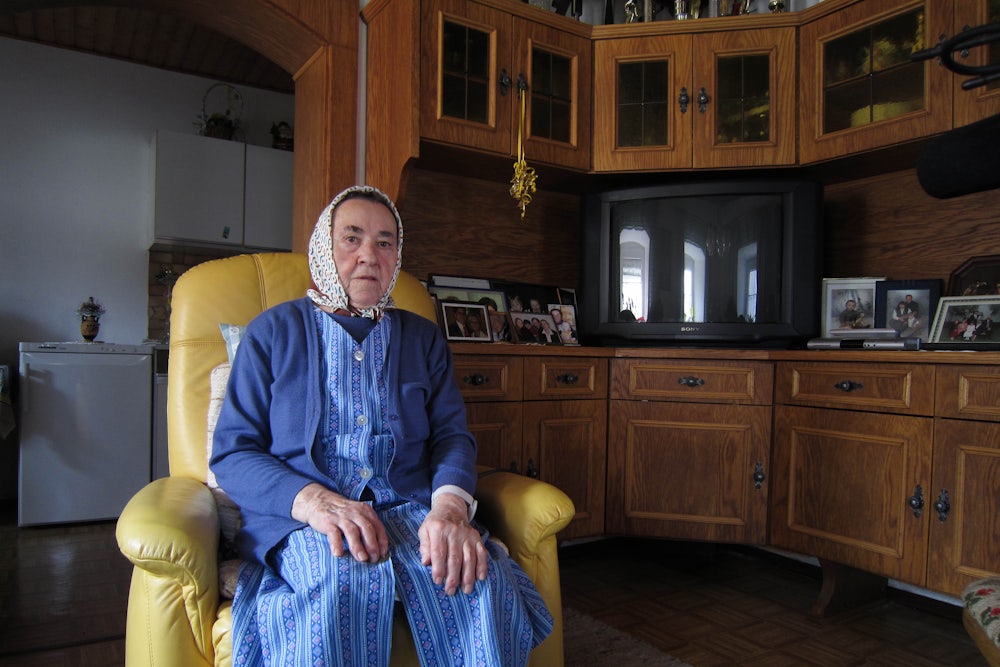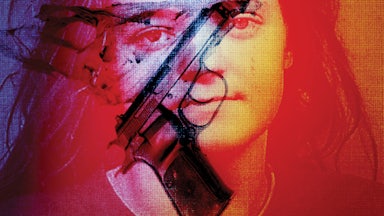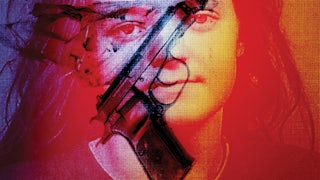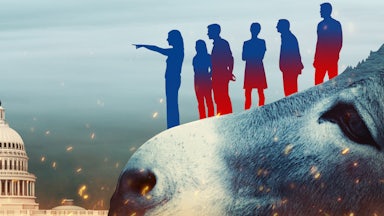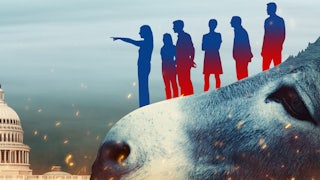What atrocities a human being is capable of and the psychic torments she might or might not suffer in consequence are, to a disturbing degree, social questions. In Joshua Oppenheimer’s disorienting 2012 documentary, The Act of Killing, a group of Indonesian gangsters reminisce in fond tones about the mass rape, torture, and murder they committed together in the mid-1960s, reenacting some favorite scenes for the camera. Swaggering, they dress each other up in candy-colored suits and hats like something out of Guys and Dolls, recall violent techniques they cribbed from Hollywood movies, and recruit women and children to play victims, instructing them on just how to beg for their lives. (After one scene, a little girl is told, “Your acting was great, but stop crying. You’re embarrassing me. Film stars only cry for a moment!”) One man turns a critical eye on tape of himself demonstrating how to garrote someone: “I would never have worn white pants. I look like I’m dressed for a picnic.” Oppenheimer’s subjects betray a boyish eagerness to impress him and the “huge audience” they anticipate for the film: “I can show you something even more sadistic than you see in movies about Nazis … because there’s never been a movie where heads get chopped off! Except in fiction, but that’s different. I did it in real life!”
The late Luke Holland’s new documentary, Final Account, is a more muted examination of similar questions, without the whizbang grotesquerie that Oppenheimer and his colleagues captured. Crafted from hundreds of interviews Holland conducted over a decade beginning in 2008 with those implicated in Nazism, it explores how perpetrators perceive and present and live with themselves. Like Claude Lanzmann’s modernist masterwork Shoah, the film alternates between interviews and sweeping shots of present-day forests and rail tracks and buildings where the camps once were. And like Shoah, it begins with a man singing—only here, instead of the survivor Simon Srebnik, it’s a former Wehrmacht soldier giving a rendition of one of the antisemitic songs from his boyhood.
Yet Holland’s film seems almost to want to sidestep ethically fraught questions of aesthetic form. For Lanzmann, it was a moral imperative not to use archival footage and imagery: Directly illustrating or representing the horrors struck him as inadequate and obscene. He was just as scrupulous about particular shots and angles. He refused, for instance, his cameraman’s suggestion to shoot a village from overhead in a helicopter (a Godlike perspective unavailable to those who’d been imprisoned there), as “a moral and artistic crime.” Final Account, a more conventional documentary, casually breaks such rules: As well as snippets of sunlit rows of little girls raising their hands in the Hitler salute or young men cannonballing into deep-blue water, it includes some images of corpses and huddled, emaciated prisoners.
As the title suggests, Holland’s distinctive contribution here is to record some of the last accounts of SS and Wehrmacht officers, and other participants and witnesses to the Holocaust, before they slip out of living memory. The youngest of his aging subjects can recall linking arms, at nine, to stop customers entering Jewish department stores; joining the Bund Deutscher Mädel for love of the blue-and-white uniforms and the marching and singing and outdoor sports; being recruited into the Hitler Youth by their elementary school teacher, a party operative; an 11-year-old elder brother showing off his brass knuckles and spikes and getting amped up to “smash the Communist H.Q. today.” Still, the film evidently doesn’t expect to provide its viewers with much new information or analysis. What power and urgency it has lies in the deliberate narrowness of its scope. Without presuming to encroach on the experiences of victims and survivors, it focuses on what people who committed the atrocities have to say about them.
Some lie brazenly, others appear to delude themselves. Some now regard their enthusiastic participation with shame, while others don’t conceal their pride in having been part of a Nazi elite or their pleasure in memories of camaraderie. One man describing the destruction of the local synagogue exhibits a curious neutrality; without any visible discomfort, he explores why this hadn’t struck him as criminal at the time: “Wait, hold on, a crime. One would almost have to say yes. If you look at it from a legal perspective, one would have to consider it a crime because it was the destruction of other people’s property…. But I didn’t feel that way.” Rather than try to strip away layers of evasion, denial, self-justification, and normalization, the film makes a study of their mechanisms.
You could see in this project a danger of reducing the Shoah to one horror among many in a long historical continuum of dehumanization and killing. But Holland, who made the film “in memory of my murdered grandparents,” clearly feels a responsibility to trace frightening ideological continuities across contexts, which is not the same as collapsing or conflating them. There is naturally a sense in which it’s hard to know or care what to make of the disparate attitudes of the elderly people appearing here, whether they repine or minimize their knowledge or involvement: At this point, they’re free to say whatever suits them best. A key scene shot in 2011, though, shows SS man Hans Werk confronted by a member of a group of students he is addressing on the site of the 1942 Wannsee Conference, where the Final Solution was worked out. The fascist-inclined young man attacks Werk for what he sees as a cowardly, even traitorous disavowal of his actions during the war: “Anybody in this room with a weakness of character,” he says, “will now think ‘Oh no! I am German. I must be ashamed my whole life.’” He finds Werk’s display of remorse disingenuous: “Everybody goes soft on camera.”
The film’s more intriguing scenes, in fact, are those few in which people are observed interacting (as opposed to the ones where one person can choose how to respond to Holland’s queries). An elaborately dressed couple sit side by side as the man describes Nazis forcing prisoners to dig their own mass graves before being shot; when he pauses to clarify that he personally wasn’t present to witness them, his wife twitches and rearranges her mouth. The dynamics between several women having tea together in an assisted-living facility are harder to read, as their accounts of what they’d believed was going on in the nearby camp awkwardly contradict one another. One claims they knew nothing; another that there were whispers, but people were afraid to discuss it; a third insists no one could conceivably have avoided knowing: “You could see the smoke from the ovens.” Belatedly, and to the surprise of some in the group—“your husband was a Nazi?”—it emerges that one of them had an SS camp-guard boyfriend, whom she cheerily admits to hiding in her flat for months after the liberation.
Small slips and turns of phrase can be just as revealing, especially when the interviewees are asked straight out about their feelings of guilt. It’s jarring to hear stoner platitudes about the nature of responsibility issue from the mouths of those directly involved in the camps. One man muses on how hypothetically “we are at least complicit in other people’s crimes. We can’t be accused of being active perpetrators, we didn’t beat or imprison anyone, but we went along with it.…” Holland interjects from behind the camera: “How can you claim you didn’t imprison anyone when you were a camp guard, a member of the SS Death’s Head unit?” The man widens his eyes, still considering this in the same philosophical tone: “A very valid question.”
Likewise, a woman in a yellow scarf announces matter-of-factly that she herself doesn’t “feel part of the collective guilt of the Germans,” even though she’s “ashamed as a German because something so cruel happened in the German name, with this meticulousness, with this bookkeeping accuracy.” It’s a striking way to characterize Nazism’s clinical, systematic horrors, given that she has in an earlier scene described her own wartime tasks as a clerk for a U-boat bunker, logging the hours and wages of the German workers, and for other, “foreign” ones, submitting only their hours, since concentration camp prisoners received no payment. Recalling people dragged back dead or alive after their shifts to maintain the required numbers, she explained that she had seen these things, as she worked so close to the bunker, adding: “But, as a bookkeeper, I had nothing to do with it.”
Final Account is not the most illuminating film we have on the Nazi atrocities, but it has an eerily approachable quality that will stay with me. My earliest memories of reading and seeing films on these subjects are of the struggle to comprehend what was finally beyond comprehension. Even though in my family the experiences of European Jews were a mere generation removed, it didn’t seem possible for me to truly imagine them. Yet watching a member of the SS argue the merits with the young man at Wannsee who shouts at him, “You should be afraid that some Albanian stabs you on public transport! You should be afraid of that but not of your own kind!” I felt an alarming familiarity. You cannot grasp what it was like. But that’s not to say you can’t understand how it happened.
